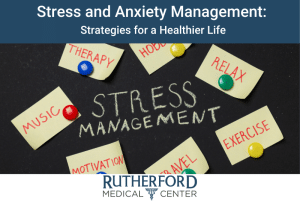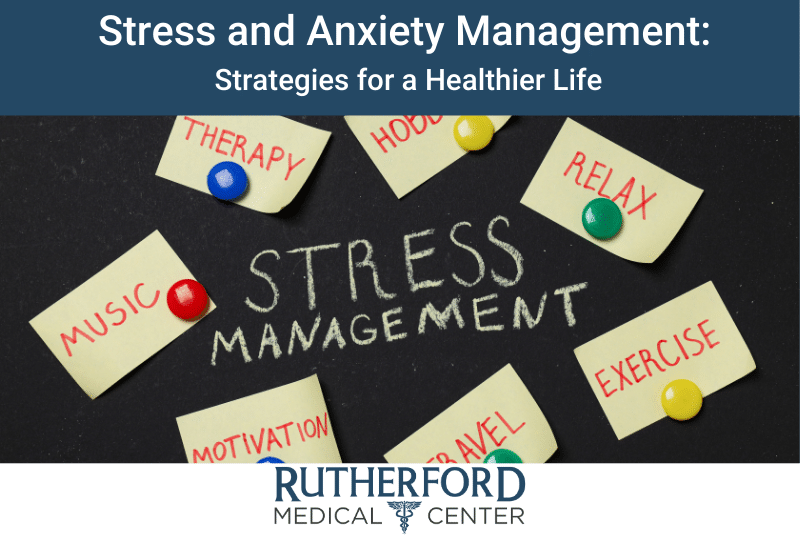September 1, 2025
 Stress and anxiety are common experiences in today’s fast-paced world. While occasional stress can motivate us to perform better, chronic stress and anxiety can take a toll on our mental and physical health. Understanding how to manage these feelings effectively is essential for maintaining balance and well-being. At Rutherford Medical Center, we are committed to helping individuals lead healthier, more peaceful lives by providing the resources and support necessary to manage stress and anxiety.
Stress and anxiety are common experiences in today’s fast-paced world. While occasional stress can motivate us to perform better, chronic stress and anxiety can take a toll on our mental and physical health. Understanding how to manage these feelings effectively is essential for maintaining balance and well-being. At Rutherford Medical Center, we are committed to helping individuals lead healthier, more peaceful lives by providing the resources and support necessary to manage stress and anxiety.
Understanding Stress and Anxiety
Stress is the body’s natural response to challenging or threatening situations. It can be triggered by various factors, such as work pressure, financial issues, health concerns, or relationship problems. Anxiety, on the other hand, is a persistent feeling of worry or fear about everyday situations, often accompanied by physical symptoms like increased heart rate, sweating, and trouble concentrating.
While both stress and anxiety can manifest similarly, stress is typically tied to a specific event or situation, while anxiety tends to linger without a clear cause.
The Impact of Stress and Anxiety on Health
Prolonged stress and anxiety can lead to a range of health issues, including:
- Cardiovascular problems: Chronic stress raises blood pressure and increases the risk of heart disease and stroke.
- Mental health disorders: Anxiety and stress are major contributors to conditions such as depression and panic disorders.
- Weakened immune system: Stress can suppress the immune response, making the body more susceptible to infections and illnesses.
- Sleep disorders: Stress and anxiety often cause insomnia, leading to fatigue and difficulty focusing.
- Digestive issues: Stress can contribute to digestive problems like irritable bowel syndrome (IBS) and ulcers.
Effective Stress and Anxiety Management Techniques
Managing stress and anxiety requires a holistic approach that addresses both the mind and body. Here are several strategies that can help:
1. Mindfulness and Meditation
Practicing mindfulness helps you stay present in the moment and reduces the mind’s tendency to overthink or worry about the future. Meditation, deep breathing exercises, and yoga are excellent ways to cultivate mindfulness and calm the mind.
2. Physical Activity
Exercise releases endorphins, the body’s natural mood boosters, and helps alleviate the physical tension associated with stress. Whether it’s a brisk walk, a yoga session, or a workout at the gym, regular physical activity is crucial for stress management.
3. Healthy Diet
A balanced diet can improve mood and energy levels. Eating foods rich in omega-3 fatty acids (like salmon and walnuts), whole grains, and plenty of fruits and vegetables supports mental well-being.
4. Adequate Sleep
Ensuring that you get 7-9 hours of restful sleep each night is crucial for mental health. Establishing a regular sleep routine, avoiding caffeine late in the day, and creating a relaxing bedtime environment can help you achieve better sleep.
5. Social Support
Connecting with family and friends can provide emotional support and help reduce feelings of isolation. Sometimes, simply talking to someone about what’s causing stress can offer a new perspective and relief.
6. Professional Support
If stress and anxiety become overwhelming, seeking help from a healthcare professional is important. Cognitive-behavioral therapy (CBT), counseling, and medication can offer effective treatments for managing anxiety and stress-related disorders.
Comprehensive Q&A Section
Q: What’s the difference between stress and anxiety?
A: Stress is a response to external pressures or demands, while anxiety is a feeling of fear or unease that often persists even when the cause of stress is no longer present. Stress is typically linked to a specific event, while anxiety can occur without a clear trigger.
Q: When should I seek professional help for stress and anxiety?
A: If stress or anxiety is affecting your daily life, causing persistent physical symptoms (such as insomnia, headaches, or muscle tension), or interfering with your ability to perform everyday tasks, it may be time to seek help from a healthcare provider. Persistent feelings of hopelessness or uncontrollable worry are also signs that you should consult a professional.
Q: What types of therapies are effective for managing stress and anxiety?
A: Cognitive-behavioral therapy (CBT), talk therapy, and mindfulness-based therapies are highly effective for managing anxiety and stress. In some cases, medication may be recommended, particularly for individuals experiencing severe anxiety or panic disorders.
Q: Can lifestyle changes really make a difference in managing stress and anxiety?
A: Absolutely. Regular exercise, a healthy diet, mindfulness practices, and quality sleep can significantly reduce the physical and emotional symptoms of stress and anxiety. These changes promote mental resilience and help prevent the buildup of stress.
Q: Is it normal to feel anxious from time to time?
A: Yes, occasional anxiety is a normal part of life. However, if anxiety becomes chronic or overwhelming, it can interfere with your quality of life and may require treatment. It’s important to recognize when anxiety moves from being a temporary feeling to something more persistent.
Q: How can I help a loved one who is struggling with stress and anxiety?
A: The most important thing you can do is listen and provide support without judgment. Encourage them to seek professional help if necessary and remind them that managing stress and anxiety takes time and effort. You can also offer to engage in relaxing activities together, such as walking or practicing mindfulness.
How Rutherford Medical Center Can Help
At Rutherford Medical Center, we offer a range of services designed to help individuals manage stress and anxiety. Our team of medical professionals provides personalized care plans that include counseling, therapy, and medication management, as needed. We also offer workshops and classes focused on mindfulness, relaxation techniques, and physical health, which all play a role in reducing stress.
Rutherford Medical Center
12755 Century Dr, Suite A
If you or a loved one are struggling with stress or anxiety, don’t hesitate to reach out. We’re here to help you find peace of mind and improve your overall health.
With effective strategies and the right support, managing stress and anxiety is possible. At Rutherford Medical Center, we’re committed to helping you live a healthier, more balanced life. Reach out to us today for personalized care and support.
